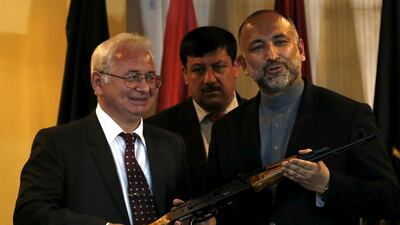This week Russia announced it would postpone multilateral peace talks with the Taliban, originally scheduled for September 4 in Moscow. The announcement was a delayed embrace of common sense, considering the meeting could do little to bring about peace in Afghanistan.
Both the Afghan and US governments had refused to attend. The Indians, wary of sitting at the same table as the Taliban without the Afghan government, were pondering a lower level of representation. For a process meant to seed peace, the Moscow talks were remarkably fractious before they even happened.
That they have been called off and no new date set underscores the growing sense of international inertia over Afghanistan. There are no specific plans in the works for negotiation with the Taliban and an end to the long-running conflict. Afghan president Ashraf Ghani has offered talks without preconditions but Taliban leader Mullah Haibatullah Akhundzada recently repudiated this harshly. Calling Mr Ghani's administration a "corrupt regime" and a "puppet", he demanded direct talks with the US to end the foreign "occupation" of Afghanistan.
After a brief ceasefire over Eid Al Fitr in June – the Taliban’s first ever – the US held secret talks with the insurgent group in Qatar. But that conversation doesn’t seem to have been engaging enough for the parties to want to do it again in a hurry.
All of this adds up to a dismal sense of drift. There appears to be no coherent policy on the way forward, not just in Kabul, but from the other players in Afghanistan – Washington, Islamabad, Beijing, Tehran, New Delhi and Moscow.
The Russians are a relatively recent addition to the crowded picture of power-brokers and potential peace negotiators. Russia is not particularly loved in Afghanistan, which has memories of the Soviet decade of intervention from December 1979. And yet it is Moscow that seems the most proactive, offering ideas that mostly go nowhere.
There seems to be no clear path ahead. After 17 years, the US-led war appears doomed to a never-ending cycle of training, advising and assisting Afghan forces so they might one day, perhaps, defend themselves and their country. But just how grinding – and endless – it might be was grimly apparent on August 11.
The Taliban laid siege to Ghazni, a city barely 100 miles from the capital Kabul. They cut off access to a key highway and engaged the Afghans and their American helpers in a fierce five-day fight before being forced out. The Afghan forces were woefully unprepared. But for the Americans, the Taliban would have seized control of an Afghan provincial capital for the first time since 2015.
But how long can the US realistically expect to be in Afghanistan? Last week marked one year of Donald Trump’s new strategy for American engagement in the country. There was no end point, he said when he announced his strategy, but “no blank cheque” either. “Nation-building” was over, he added, declaring that “from now on, victory will have a clear definition”.
He then proceeded to spell out his notion of victory. It would be about “attacking our enemies, obliterating ISIS, crushing Al Qaeda, preventing the Taliban from taking over Afghanistan and stopping mass terror attacks against America before they emerge".
Only the first and last items on that ambitious laundry list are manifestly and consistently in focus. The move to "obliterate" ISIS in Afghanistan, or ISIS-K, also continues fitfully, although the weekend saw a key triumph when its leader Saad Arhabi was killed in a US airstrike in the eastern province of Nangarhar.
Overall though, the gains on the ground have been pitiful. As has been the dirge with every successive year since the US operation of 2001, the Taliban now controls more territory in Afghanistan than at any point since it was ousted. From January to July of this year, there were 1,692 civilian deaths, according to the UN Assistance Mission in Afghanistan, a higher casualty rate than in any comparable period since record-keeping began a decade ago.
Faced with these demoralising metrics, the Afghan and American governments have offered strategy-lite, a fuzzy distillation of the news of the day without a big picture assessment or any realisable vision for the future.
Right now, the only reasonable certainties are stark. The US wants to exit Afghanistan as quickly and decently as possible. The Taliban are increasingly globetrotting (to Uzbekistan, Indonesia and Russia) in their search for support. The Afghan government knows a foreign presence is not a solid foundation for nation-building but is fearful of the consequences of US withdrawal.
In theory, an immutable imperfect pattern should be an impetus to change, which would be the only way to work towards some form of perfection. Unfortunately, that’s not in evidence in Afghanistan.


